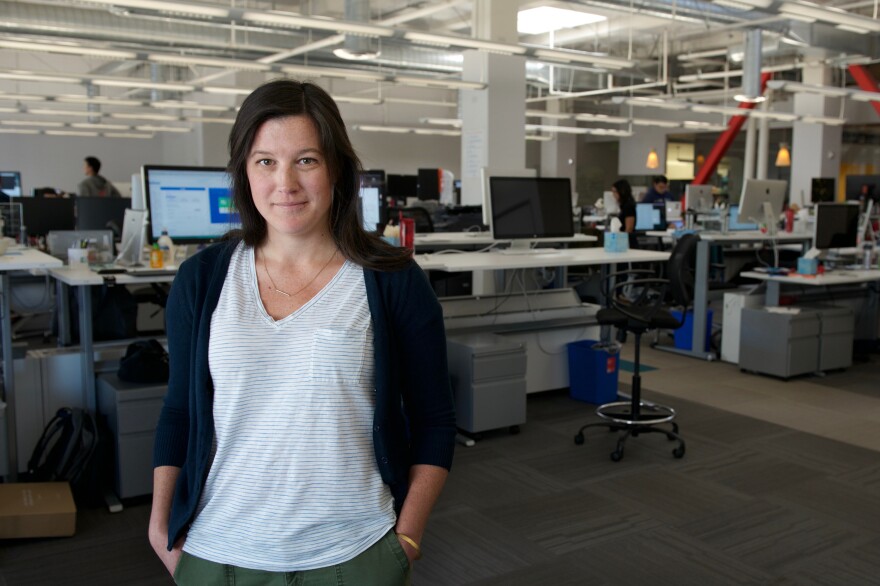It's peak online dating season.
According to Match.com, late December through Valentine's Day is the busiest time of the year for dating apps and sites. It's sometimes called "cuffing season" — a nod to the idea that people want to find a serious relationship during the cold months.
According to a Pew study conducted in 2015, its most recent look at online dating, 59 percent of American adults say going online is a good way meet people — a 15 percent increase from a decade ago. In fact, in 2015, 15 percent of American adults used a dating app or website — a number that has likely increased in the years since the study.
Clearly, Americans' attitudes have changed about online dating. But how has online dating changed the connections we make?
To find out, Morning Editionasked two online daters who also spend their days thinking about online dating: Megan Murray, a senior content strategist for Zoosk, an online dating site and mobile app, and Skyler Wang, a Ph.D. candidate in sociology at the University of California Berkeley. Wang also taught an undergraduate course at the University of British Columbia called What Makes Us Click, about online dating and he gave NPR permission to use his course title for Morning Edition's series on online dating.
"The way people meet is different, and that has to affect the relationships we form," Murray tells Morning Edition's David Greene.
What's different today?
What was once taboo and unusual is so commonplace that for some, it's strange to meet a date in person before making any online connection.
"I found that people don't approach people as much when they're in person when you go to bars," Murray says.
Wang, who identifies as gay, says before he and his friends go out to a bar, his friends go on dating apps Tinder and Grindr to meet people at the bars where they're headed. "Now, the 'gayborhood' is in your cell phone," he says. "I think technology has created a better, more democratic social environment for especially marginalized groups."

Apps have made online dating more accessible; from 2013 to 2015, the number of American adults that have used a dating app has tripled. And as Americans try new ways to connect, the norms of dating are evolving.
"Dating has always been hard," Murray says, "but the dynamics have changed."
For example, how long should you wait before returning a message?
Murray says that when it comes to online dating, the two-day rule — waiting a period of time, generally 48 hours days, to respond to messages — does not generally apply. Men who waited two days to reply to their Zoosk matches got responses 45 percent of the time, while men who replied same day and got responses 63 percent of the time.
Data-driven romance
For many, the gradual shift in America to a data-driven culture is also shaping our dating lives.

"Basically, people use lists nowadays to get a better sense who they're attracted to and put a very quantitative twist to something that didn't used to be like that," Wang says.
Some people use spreadsheets to help keep track of what they did and didn't like about dates. And filters on dating apps and sites allow users to create a pool of potential matches based on specific criteria. Filters let users set preferences for age or location, and some services allow daters to search for matches by interests, religion or occupation.
Zoosk has found that people who use filters receive fewer replies to their messages. Murray says that people who turn their filters off tend to have longer conversations with their matches.
"Maybe what this is saying is that the perfect person doesn't live next door," Murray says.
Wang cautions that this kind of approach to dating lets users act like they are shopping, which isn't necessarily a good thing. He calls the practice "relationshopping," and he warns that it not only objectifies others, it de-emphasizes the importance of building a relationship. People sometimes treat dating as if they are looking for the perfect dress or handbag, Wang says.
"Relationshopping is problematic because people give up so quickly now," Wang says, "and for the most bizarre reasons." He says that people may choose to not go on a second date with someone simply because they don't like their hair.
"It makes you feel like people are a commodity," he says.
The end of magic?
Technology may offer opportunities to efficiently curate a dating pool, but what about the magic of connecting with someone?
"I do think the romance and the magic sneaks in there no matter what," Murray says. "If you really care about someone and you meet them there's going to be these indefinable moments ... or maybe you realize you're both keeping spreadsheets," she says with a laugh. "There's always going to be some sweet little thing that comes through."
In fact, Wang says, some sites describe themselves as more of an introduction service than a dating site.
"The dating doesn't happen online. The dating happens in person," Wang says. "So in a way they're trying to preserve that magic."
Copyright 2020 NPR. To see more, visit https://www.npr.org. 9(MDAwMzY5MzE4MDEzMTE3ODg5NDA4ZjRiNg004))



